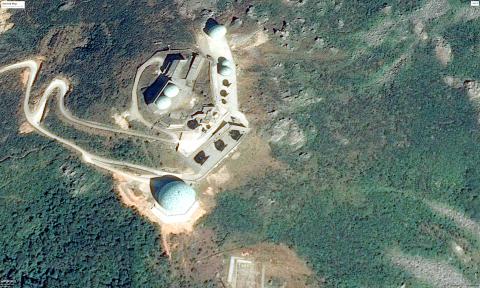China has installed new aerial listening stations on the coast of its Fujian Province, a military spokesman said yesterday, adding that measures are being taken to counter surveillance and enhance the security of important electronic communications.
Ministry of National Defense spokesperson Major General David Lo (羅紹和) said the military is monitoring the development closely and that Taiwan has its own surveillance system to deal with intelligence gathering by Chinese signal-snooping stations.
The statement came one day after the Canada-based Kanwa Information Center reported that the Chinese People’s Liberation Army (PLA) had set up at least three large aerial listening stations, directly across the Strait from Taiwan.

Photo: CNA, provided by Kanwa Information Center
Lo said that the ministry has instructed its telecommunications units to strictly follow established regulations on frequency signals and radio data encryption to ensure the security of classified information.
According to Kanwa, the PLA has been installing new facilities in Fujian to monitor telecommunications and radio signals, including mobile phones and other types of wireless communications, from military bases and government institutions across the nation’s western region.
One new monitoring station is reportedly only about 23km from the PLA’s Longtian Air Base, where S-300 PMU-2 surface-to-air missiles are deployed. All the antennae and radar dishes at the base are directed toward Taipei and Greater Taichung, Kanwa reported.
Two other new Fujian bases have installed radomes and antennae to intercept electromagnetic waves from Taiwan’s military radar systems, as well as other telecommunications and radio signals, the report said.
It is known that the stations are administered by the Third Department and Fourth Department of the PLA’s General Staff Department, which are responsible for “technical reconnaissance” and cyberwarfare, monitoring telecommunications traffic, electronic countermeasures and radar intelligence-gathering.
A satellite photograph in the Kanwa report shows that the monitoring station near Longtian Air Base has 10 parabolic radar antennae of various sizes, and six large radomes — a weatherproof enclosure that protects a radar antenna inside it.
According to a defense expert in Taiwan, the station is a signals intelligence base established in 1952 that has been upgraded.

CHAOS: Iranians took to the streets playing celebratory music after reports of Khamenei’s death on Saturday, while mourners also gathered in Tehran yesterday Iranian Supreme Leader Ayatollah Ali Khamenei was killed in a major attack on Iran launched by Israel and the US, throwing the future of the Islamic republic into doubt and raising the risk of regional instability. Iranian state television and the state-run IRNA news agency announced the 86-year-old’s death early yesterday. US President Donald Trump said it gave Iranians their “greatest chance” to “take back” their country. The announcements came after a joint US and Israeli aerial bombardment that targeted Iranian military and governmental sites. Trump said the “heavy and pinpoint bombing” would continue through the week or as long

TRUST: The KMT said it respected the US’ timing and considerations, and hoped it would continue to honor its commitments to helping Taiwan bolster its defenses and deterrence US President Donald Trump is delaying a multibillion-dollar arms sale to Taiwan to ensure his visit to Beijing is successful, a New York Times report said. The weapons sales package has stalled in the US Department of State, the report said, citing US officials it did not identify. The White House has told agencies not to push forward ahead of Trump’s meeting with Chinese President Xi Jinping (習近平), it said. The two last month held a phone call to discuss trade and geopolitical flashpoints ahead of the summit. Xi raised the Taiwan issue and urged the US to handle arms sales to

BIG SPENDERS: Foreign investors bought the most Taiwan equities since 2005, signaling confidence that an AI boom would continue to benefit chipmakers Taiwan Semiconductor Manufacturing Co’s (TSMC, 台積電) market capitalization swelled to US$2 trillion for the first time following a 4.25 percent rally in its American depositary receipts (ADR) overnight, putting the world’s biggest contract chipmaker sixth on the list of the world’s biggest companies by market capitalization, just behind Amazon.com Inc. The site CompaniesMarketcap.com ranked TSMC ahead of Saudi Aramco and Meta Platforms Inc. The Taiwanese company’s ADRs on Tuesday surged to US$385.75 on the New York Stock Exchange, as strong demand for artificial intelligence (AI) applications led to chip supply constraints and boost revenue growth to record-breaking levels. Each TSMC ADR represents

State-run CPC Corp, Taiwan (CPC, 台灣中油) yesterday said that it had confirmed on Saturday night with its liquefied natural gas (LNG) and crude oil suppliers that shipments are proceeding as scheduled and that domestic supplies remain unaffected. The CPC yesterday announced the gasoline and diesel prices will rise by NT$0.2 and NT$0.4 per liter, respectively, starting Monday, citing Middle East tensions and blizzards in the eastern United States. CPC also iterated it has been reducing the proportion of crude oil imports from the Middle East and diversifying its supply sources in the past few years in response to geopolitical risks, expanding